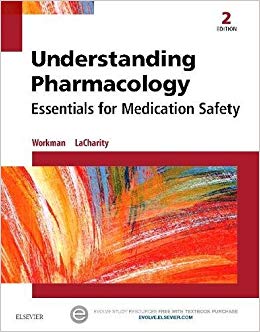
Pharmacology can be difficult. But with the right text, understanding drugs and how they work doesn’t have to be! Using easy-to-follow language and engaging learning tools ― like Memory Joggers, Clinical Pitfalls, Do Not Confuse, and Drug Alerts ― the second edition of Understanding Pharmacology: Essentials for Medication Safety helps readers really understand how drugs work. In addition to the popular critical thinking activities from the first edition, the second edition also includes more chapter review questions, updated content, and a new organization that centers on the different body systems. For students who have a limited background in the sciences and want complete preparation for licensure exams and clinical practice, there is no better choice than Understanding Pharmacology, 2nd Edition!
- Entire unit reviewing math, weights and measures, and dosage calculation minimizes readers’ anxiety and promotes medication safety.
- Clever, easy-to-recognize margin icons help visual learners remember essential side effects of drugs.
- Simplified heading structure replaces intimidating terminology (i.e. pharmacokinetics) with simplified language (How These Drugs Work) to increase understanding of concepts.
- Drug Alert!, Do-Not-Confuse, and Clinical Pitfall boxes highlight important tips for safe medication administration.
- Memory Jogger boxes help readers remember important drug information.
- Get Ready for Practice sections at the end of each chapter include key points, chapter review questions, and critical thinking activities to reinforce learning.
- 10th grade reading level uses straightforward, everyday language to really enhance readers’ understanding of pharmacology concepts.
- Incorporation of adult learning theory features both a simple to complex organization of material along with answers to why readers need to learn something.
- NEW! Body system organization helps readers better understand drugs that are specific to particular body systems.
- NEW! More chapter review questions have been added to the text. All review questions are now organized into one of two categories: Test Yourself on the Basics and Test Yourself on Advanced Concepts.

